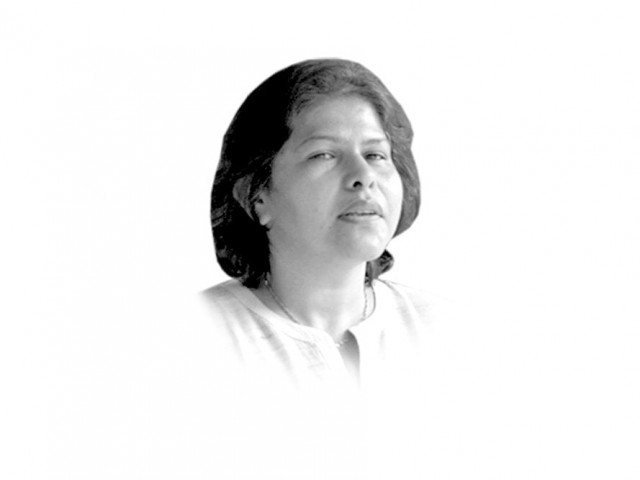Islands in the Sand
The key problem with the liberal elite is that they tend to live and survive on their self-created small islands.

The writer is an independent social scientist and author of Military Inc.
Those protesting the change in name must realise two things urgently. First, going against the new name could draw wild reaction that could risk the monument. Second, why would the place be renamed differently, especially in the absence of an alternative voice from the civil society? What does the city have in the name of civil society except a couple of corrupt NGOs pushed by certain state functionaries pretending to represent an alternative voice? The tragedy of liberalism in Pakistan (even larger South Asia) is that it is now mainly confined to drawing rooms and Twitter. It is cute to see people taking risks on social media and then rising to prominence due to threats on Facebook or Twitter. The fear of violent reaction in real life is too intense for many to do more.
The name change simply represents strong religionism in society. This was inevitable in a state that was manufactured, as historian Faisal Devji records in his very exciting new book, The Muslim Zion, around the concept of religious nationalism that challenges the nation-state’s inherent formula of territoriality. According to Devji, Israel and Pakistan were the only two states for which the new manufacturing concept was followed. Hence, the state had to turn into, what the author of Making Sense of Pakistan, Farzana Sheikh, would consider as, Allama Iqbal’s Pakistan. It is informally and in an unstructured way, run through Sharia law. While we waste time in arguing what Mohammad Ali Jinnah actually wanted the nation to be, others, who are more influential, are slowly working towards making a case that the founding father never hinted at making the state liberal and secular. For example, a civil servant and columnist recently challenged authenticity of Jinnah’s August 11 speech.
How could liberalism survive in a country where the liberal-secular elite ensured the death of this principle? The liberal Liaquat Ali Khan, who otherwise impressed his Western audience with his high capacity to ‘hold his drink’ gave a structure to the principle of religious nationalism by incorporating religion as the formula for governance in the Objectives Resolution 1949. Subsequently, the state’s title was changed from dominion to Islamic Republic in the country’s first 1956 Constitution. The Objectives Resolution established religion as the country’s grundnorm.
Another watershed was 1974, when Zulfikar Ali Bhutto, another liberal leader, implemented the grundnorm by declaring Ahmadis non-Muslims. For those who argue that the culpability of harm brought to Ahmadiya people lay with Ziaul Haq, the fact is that Bhutto’s decision was critical in shifting the direction of the state from secular to more formally religious. The decision meant that the state had changed its character and would now adjudicate on matters of faith and like any religious state, for example Israel, would define who was a Muslim or not. Of course, Zia’s 10 years cemented the shift almost completely.
We hear many excuses for the engagement of the liberal leadership with the religious right and its ideology. The best and the easiest is realpolitik or convenient accommodation of the right wing in order to save the day. Opinion on liberal accommodation of the right can then be classified between those who feel sorry and sympathetic versus others who get extremely angry at this kind of leadership. However, those falling under the category of liberal tend to forget that they suffer from the same problem as those they blame for narrowing social space in this country through their decisions. The key problem with the liberal elite is that they tend to live and survive on their self-created small islands.
A few days ago, I had a chance to visit a tea shop in Lahore. I could have been anywhere — Paris, London or New York. Nothing wrong with a nice ambience except that it can also put you to sleep. The eatery symbolised one of the many small islands that the liberal elite have created for themselves where they can not only withdraw but also imagine that nothing has changed around them. So, religion is declared as a poor man’s obsession which, at best, can be treated through investing in milder forms of religious discourse. Any inconvenience that may occur can be managed through negotiating the territorial space between the liberal haves versus religious have-nots. Thus, the New Year parties may be shifted away from the religious downtown to the relatively open farmhouses in suburbia. Such negotiation of physical space averts the threat to personal lifestyle but it also makes people ignore that a social metamorphosis is taking place.
There is yet another kind of liberal voice that tends to do image management through accepting that religion is here to stay. Then they selectively take nice parts of religious history to argue that there is no problem with a religious polity and that violence occurs only due to poverty. It is indeed a tough century ahead in which bloodletting is inevitable while we find a formula to reconstruct both religion and liberal space.
Published in The Express Tribune, January 9th, 2014.
Like Opinion & Editorial on Facebook, follow @ETOpEd on Twitter to receive all updates on all our daily pieces.















COMMENTS
Comments are moderated and generally will be posted if they are on-topic and not abusive.
For more information, please see our Comments FAQ